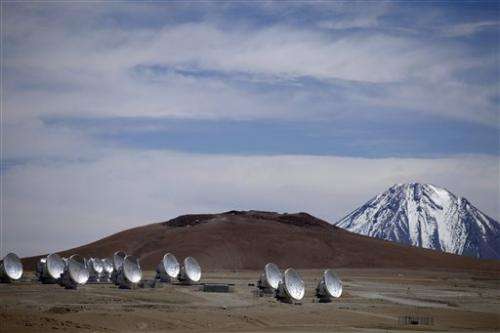In this Sept. 27, 2012 file photo, radio antennas are spread out on the terrain as part of one of the worlds largest astronomy projects, the Atacama Large Millimeter/submillimeter Array (ALMA) in Chajnator in the Atacama desert in northern Chile. Workers at the world's largest radio telescope are staging a strike to demand a 15 percent salary increase and benefits to compensate for the high altitude and isolation they endure at their jobs. (AP Photo/Jorge Saenz, File)
Workers at the world's largest radio telescope went on strike Thursday to demand better pay and working conditions.
The work stoppage began after union workers failed to reach an agreement with Associated Universities Inc., which employs the Chilean staff.
Nearly 200 striking workers are demanding a 15 percent salary increase as well as benefits to compensate for the high altitude and isolation they endure.
The Atacama Large Millimeter/submillimeter Array, or ALMA, is on a remote plateau above Chile's Atacama desert some 16,400-feet (5,000-meter) above sea level. Workers are exposed to strong winds, thin air and severe temperature drops.
It's the lack of humidity and low interference from other radio signals that make it the perfect spot for ALMA, which reaches farther than any other radio telescope.
ALMA searches for clues about the dawn of the cosmos, from the coldest gases and dust where galaxies are formed to the energy produced by the Big Bang. The $1.4 billion project is jointly funded by the United States, Canada, Japan and Europe.
© 2013 The Associated Press. All rights reserved.






















